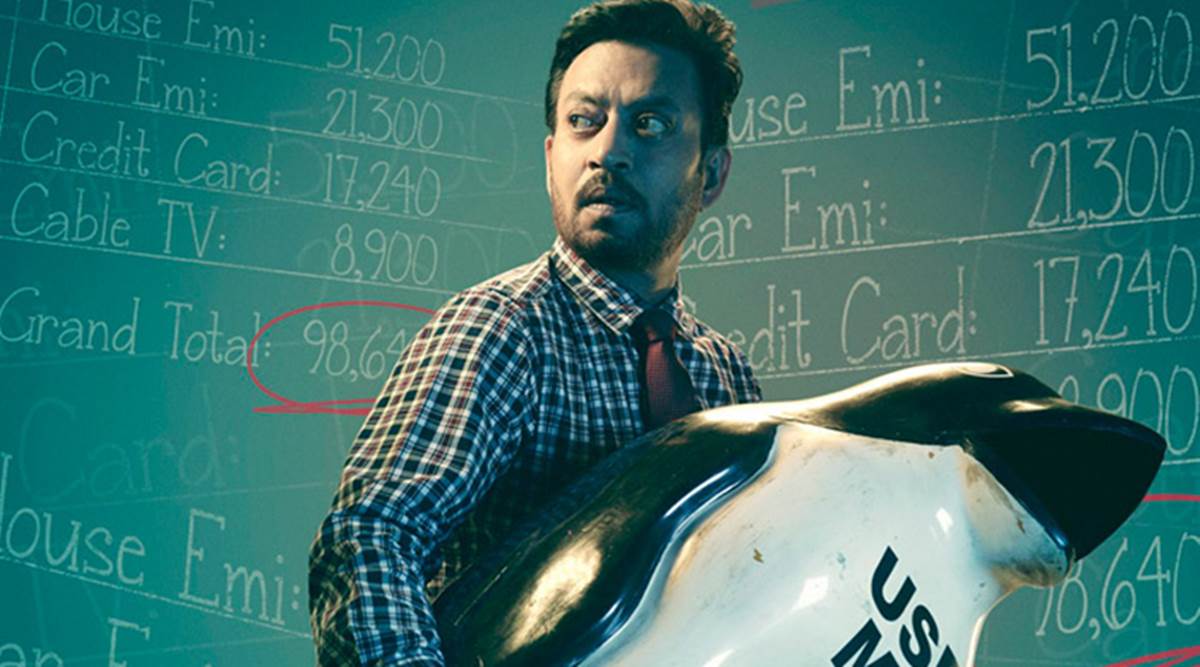
Just weeks ago, the world lost Irrfan Khan to cancer. Khan chased multidimensional stories, and performed in them with a depth of character rare for an actor. His fame even spread to Hollywood following performances in Life of Pi, Slumdog Millionaire, and The Namesake. In his memory, we take a look at one of his most complex final films: Blackmail.
Bollywood is famous for its romcoms, full of colorful spectacles and flashy dance numbers. Refreshingly, other genres like dark comedies that unravel the romcom monoculture are becoming more common, spearheaded by stars like Khan. Blackmail is one such movie. It stars Irrfan Khan as Dev Kaushal, a man who finds out that his wife Reena (Kirti Kulhari) has been cheating on him for years with her old lover Ranjit (Arunoday Singh).
After entertaining a fantasy of murdering both Reena and Ranjit, Dev instead decides to blackmail Ranjit so he can pay his surmounting debts. The blackmailing then spiderwebs across the entire cast. Every character tries to extort each other; even Dev becomes a target. While the countless lies and two-faced characters lead to a convoluted plot, the story’s increasing stakes will keep you hooked.
Unlikable Characters That Draw You In
Blackmail doesn’t try to make you like any of its characters. Reena and Ranjit cheat on their respective spouses, and cover their affair by taking money from the very people they cheated on. Dev’s friend Anand (Pradhuman Singh) attempts to date rape a coworker, and even Dev himself regularly steals pictures of his coworkers’ wives to masturbate to in the office bathroom, in a self-obsessed game of revenge. The moment your sympathy for a character’s misfortune teeters on the edge of liking them, the film immediately reminds you that they’re a horrible person. You can’t peel your eyes away, or you might miss how deep the rabbit hole goes.
An interesting challenge confronts the viewer—in a situation where every character is disgustingly selfish, whose lies should come out on top? As the audience justifies increasingly reprehensible actions to try to rally behind a protagonist, Blackmail succeeds in dragging them down to the same level as the characters. Every character puts on a thin veneer of caring over their darker selves, leading introspective viewers to question whether they do the same. Oddly enough, this actually makes you even more attached to the characters’ fates. This tale of revenge and justice is full of intriguing personalities, escalating antics, and dark satisfaction as each character meets their judgment.
Justice Is Complicated

At its core, Blackmail asks poignant questions about justice. The film provides just enough mystery about characters’ pasts to help viewers shift some of the blame away.
For instance, without India’s arranged marriages, perhaps Reena and Ranjit would be married rather than having an affair. While many modern Bollywood films try to depict arranged marriages as successful or oppressive, Blackmail pushes no agenda. Instead, it focuses on the extra uncertainty that arranged marriages adds to the already confusing world of love. Reena and Ranjit betray their arranged spouses for love, and then betray each other for money and their marriages. Meanwhile, it’s never clear whether Dev actually loves his wife. He spends nights in the office playing Pac-Man, leaving only his late-night voyeurism of Reena as evidence of his feelings. Perhaps, Blackmail suggests, neither tradition nor freedom are the crux of a relationship’s problem.
When it comes to justice in revenge, the film continues to ask rather than answer. Maybe Dev’s willingness to sabotage his friends and coworkers is retaliatory, since they have no problem doing the same to him. His boss demands more of him while withholding promised salary, his only “friend” Anand gives away his secrets to a coworker in hopes of getting laid. Every character progressively wades deeper into immorality, making “getting even” increasingly meaningless. With many conflicting motivations and rapidly-changing depraved characters, it’s easy to get confused.
Confusion for a Purpose
As each of the characters fends for themselves, they fail to see what the audience can: their motivations no longer make sense. For example, Dev regularly calculates how much he needs to settle his debts, and all of the items revolve around his and Reena’s household. He risks his life to financially provide for a home that he knows is already broken.
The nonsensicalness spreads to Blackmail’s depiction of institutions as well. The movie mocks how Indians have learned to expect corruption, lauding businessmen as “marketing geniuses” for bribing the local government to shut off water to thousands of people to increase their sales. Blackmail asks: do you fix your broken relationships and institutions, or just exploit them?
The film’s strong points lie in its thought-provoking characters, not its believability or subtlety. As Blackmail’s plot grows increasingly convoluted, the audience will need to heavily suspend their disbelief, and keep track of the copious characters and their motivations. The cinematography strives too hard to highlight symbolism and its own wordplay, as if congratulating itself for being deep.
Overcome these annoyances, and you’ll find the depth that drew Irrfan Khan to this script. It’s a film that will make you introspect human nature without being preachy. Instead, it chooses to keep you engaged through twists and absurdity. After all, you know you’ll be in for an unorthodox ride when a film begins with the disclaimer, “plastic dummy fish were used in gun shot.”
• • •
Blackmail (Hindi: Blackमेल)—India. Dialog in Hindi. Directed by Abhinay Deo. Running time 2hr 19min. First released April 6, 2018. Starring Irrfan Khan, Arunoday Singh, Kirti Kulhari, Pradhuman Singh, Divya Dutta.
Blackmail is available to stream on Amazon Prime.
